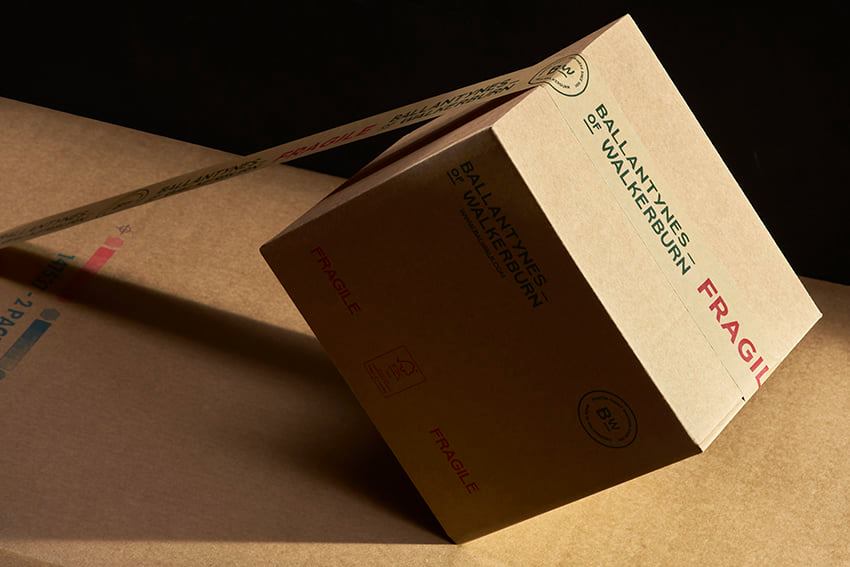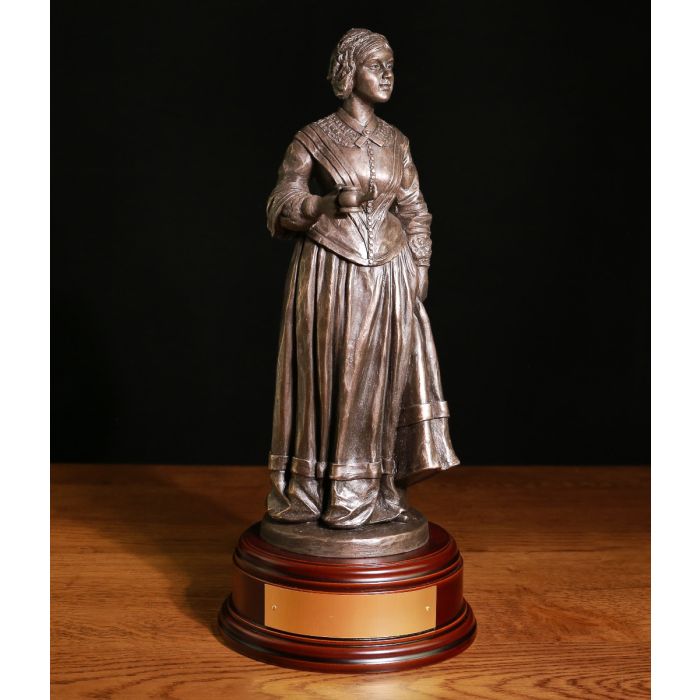- Home
- Sculpture
- Historic
- British Military by Campaign
- Crimean War
- Florence Nightingale, Military Nurse
Florence Nightingale, Military Nurse
Our Florence Nightingale nurse statuette is made within the 12 inch scale. This nursing retirement or long service gift for anyone who's served on our hospital wards and would like a cheerful reminder of their service. We include the brass plate with engraving
Florence Nightingale, 'The Lady with the Lamp '. 'Bring me 200 scrubbing brushes' was the first instruction issued by Florence Nightingale a few hours after arriving at the Military Hospital in Scutari in Turkey. Accompanied by 37 nurses, Florence had answered a call to help British soldiers who had been wounded in the Crimean War and she arrived none too late. On the day of her arrival, October 25th, 1854, the inconclusive Battle of Balaclava resulted in a huge number of wounded soldiers requiring attention and, as was normal in these days, there were neither the staff nor the facilities to assist them. But Florence was equal to the occasion. With commendable foresight she had brought £30,000 and a shipload of supplies with her and within a few weeks the death rate in the hospital had fallen from 42 per 100 to 2.
Florence Nightingale was born in 1810 into a well-to-do family with houses both in Hampshire and Derbyshire. She was educated by her father, spoke 6 languages fluently and was learned in history, mathematics and philosophy. At the age of 17 she claimed to have had an instruction from God to devote her life to nursing the sick but it was not until she was 30 years old that she joined a German religious group devoted to the study of nursing. 4 years later, fully trained and to the horror of her parents and friends, she announced that she was going to spend the rest of her life caring for the sick. And so, in 1854, she arrived in Scutari to take charge of the Military Hospital (at the request of her friend the Secretary of State for War) and begin a carreer which was to last a further 55 years. Although very unpopular with the Army Medical Service she was worshipped by the wounded soldiers who called her ' The Lady with the Lamp '; every evening after 8 oclock she would walk round the wards carrying a lamp to check on the day's work and as she passed each bed the soldiers would kiss her shadow as it crossed their pillow.
In 1855 she transferred herself and some of her nurses to the Crimea proper where she immediately ran into trouble.The Inspector General of Hospitals contended she had no authority outside Scutari but this was remedied in March, 1856 when she was made Superintendent of the Female Nursing Establishment of all British Military Hospitals. Then it was back to Britain to a hero's welcome, which she declined, to the receipt of a purse of £45,000 collected by a grateful British public which she devoted to the founding of the St Thomas's Hospital School for Nurses (the first in the World), to initiate the founding of the British Army Medical School ( 1857 ) and a campaign to improve the food, health and living conditions of the British soldier; this last campaign was received by the Establishment with tolerance but without enthusiasm.
Her successes and influence are all the more remarkable as from 1857 until her death she was a housebound invalid. From her house in London , however, she carried on a voluminous correspondence, she received large numbers of visitors from the greatest to the most humble, she read extensively and few would embark on any course of action within her sphere of interest without her personal blessing; she was particularly knowledgable about India, a country which she had never visited, and was regularly consulted on many matters by the India Office in London. Her interests ranged from the reform of workhouses to the training of midwives, from the design of hospitals to writing textbooks for nurses. At the age of 72 she organized a very successful campaign to to raise health standards in Buckinghamshire. A personal friend of Queen Victoria she had immense direct and indirect influence on all the matters which attracted her attention. 'Such a head! ', the Queen once said 'I wish we had her in the War Office !'
By 1901 she was completely blind, she had suffered from poor eyesight all her life, and in 1907 she was awarded the Order of Merit by the King - the first woman ever to receive this very high honour. She died on August 13th, 1910, and, having earlier declined the offer of a State Funeral and burial in Westminster Abbey, was buried in the family grave in Hampshire. Nevertheless her coffin was transported to the graveyard on a gun carriage and carried to the family crypt on the shoulders of six Army sergeants.
In an effort to be more sustainable we've had our outer packaging redesigned to be fully recyclable. Every statue comes in a simple elegant printed brown box with printed fabric tape.
Inside the box the statue will be protected with bubble wrap and special foam bags to minimise the chance of damage in transit.

All our statues include an optional engraved plate on the wooden base. On the bronze statues the plate is jewellers brass and the pewter/ silver statues have a nickel silver plate.
To add a plate to your statue please select the option above and enter your engraving details. Please note if the engraving is left blank no plate will be included. If you'd like a blank plate please write this in the engraving details.
Please DOUBLE CHECK the engraving as mistakes will require a new plate to be made.
On the engraving the text will be centred and the font sized to fit the plate.
| Product Code | A76b Florence |
|---|---|
| Price Code | FC |
| Sculpting Scale | 12" |
| Base Material of the Statue | Cold Cast Resin |
| Height Including Presentation Base | 12" / 30cm |
| Width with Presentation Base | 6" / 15cm |
| Depth with Presentation Base | 6" / 15cm |
Please be aware that these measurements are not exact and have been rounded for ease.
As every item is individually handmade the exact dimensions may vary slighty.
